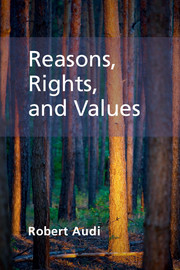Book contents
- Frontmatter
- Contents
- Preface
- Acknowledgments
- Introduction: practical reason, moral justification, and the grounds of value
- PART I REASONS FOR ACTION
- 1 Reasons, practical reason, and practical reasoning
- 2 Intrinsic value and reasons for action
- 3 The grounds and structure of reasons for action
- 4 Practical reason and the status of moral obligation
- PART II INTUITION, OBLIGATION, AND VIRTUE
- PART III RELIGION, POLITICS, AND THE OBLIGATIONS OF CITIZENSHIP
- Index
2 - Intrinsic value and reasons for action
from PART I - REASONS FOR ACTION
Published online by Cambridge University Press: 05 May 2015
- Frontmatter
- Contents
- Preface
- Acknowledgments
- Introduction: practical reason, moral justification, and the grounds of value
- PART I REASONS FOR ACTION
- 1 Reasons, practical reason, and practical reasoning
- 2 Intrinsic value and reasons for action
- 3 The grounds and structure of reasons for action
- 4 Practical reason and the status of moral obligation
- PART II INTUITION, OBLIGATION, AND VIRTUE
- PART III RELIGION, POLITICS, AND THE OBLIGATIONS OF CITIZENSHIP
- Index
Summary
The concept of the good – or at least some concept of the good – has been a central topic in ethical theory since Plato. Moral philosophers have generally recognized a distinction between what is good only as a means and what is good in itself. The latter, often called the intrinsically good, has proved difficult to explicate and, by contrast with the former, seems to many philosophers to be mysterious. G. E. Moore sought to clarify the notion of the intrinsically good, and his theory of value was probably the most influential axiology developed in the twentieth century. The theory is closely tied to his metaphysics, his epistemology, and his normative ethics; but much of what he says about the good can be maintained without commitment to all of his major claims in those three domains. My project here is to set out a theory of intrinsic value that incorporates the best elements of Moore's account of the notion but avoids commitment to his overall view in metaethics.
I Some major elements in Moore's theory of value
Since my aim is to produce a sustainable account of intrinsic value, I must be brief in introducing the elements in Moore's account that form a good basis for critical discussion and for comparison with my view. I begin with his famous claim
that ‘good’ is a simple notion, just as ‘yellow’ is a simple notion; that, just as you cannot, by any manner of means, explain to anyone who does not know it, what yellow is, so you cannot explain what good is. Definitions of the kind that I was asking for, definitions which describe the real nature of the object or notion denoted by a word, and which do not merely tell us what the word is used to mean, are only possible when the object or notion in question is something complex.
- Type
- Chapter
- Information
- Reasons, Rights, and Values , pp. 41 - 70Publisher: Cambridge University PressPrint publication year: 2015



